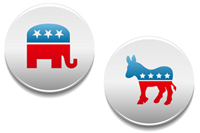Political Relevance Depends on Internet
By Liz Herrin In Blogging News, Industry News
Ranking in this list are both Arianna Huffington and Jon Stewart. Huffington is the mastermind behind the hugely successful political blog the HuffingtonPost.com, while Stewart is the host of the irreverent news show and associated website TheDailyShow.com.
And they’re not the only figures using the internet to fuel the political discussion. Former Daily Show correspondent Stephen Colbert broke off to form his own show, The Colbert Report. And shortly after, he tried to throw his hat into the 2008 presidential race. The political run was a satirical farce, but he received a surprising amount of support from his dedicated fan base—the “Colbert Nation.” And where did the Colbert Nation coalesce? Where else than ColbertNation.com?
But the popularity of these figures speaks to a wider phenomenon. The internet is making politics and politicians accessible in an entirely new way. People are no longer passively receiving the news through an established television network or newspaper. Rather, they are seeking out answers themselves.
In the internet age, people have grown wary of the favored tool of televised news—the sound bite. Tired of hearing the “I was taken out of context” excuse, people are simply cutting out the middleman. More and more, they’re going straight to the source to watch unedited footage of speeches and debates. Some of the more dedicated individuals even read position papers to grasp a candidate’s views. And where are those available? Just do a quick Google search, and you’ll find them.
The internet has also revolutionized politics in that a busy schedule is no longer an excuse for political apathy. If you missed Obama’s nominee speech, it’s available 24/7 to be watched at your convenience. And with the prevalence of blogs, people are doing more than just absorbing political news. They’re actually helping to create it by adding personal thoughts and reactions to the events as they unfold.
While political discussion used to be the favored pastime of the elite academia, the internet has made it accessible and relevant to anyone with a laptop and internet connection. And politicians (along with comedians and bloggers) are noticing this trend and moving towards the viral.


No Comment